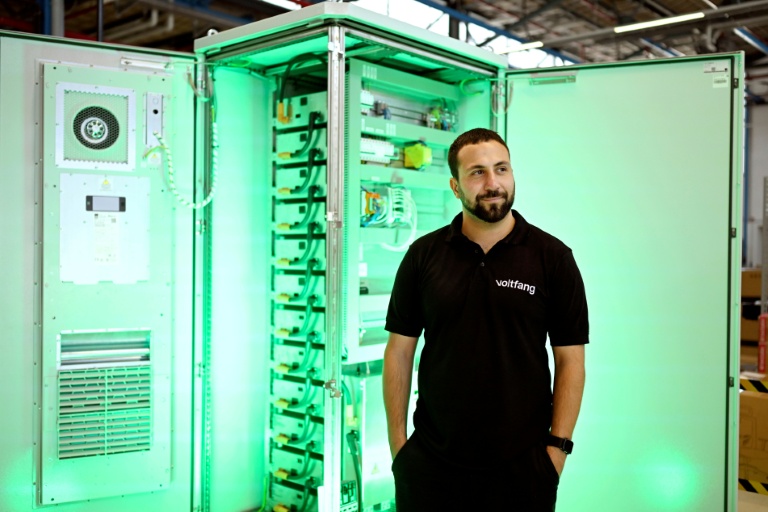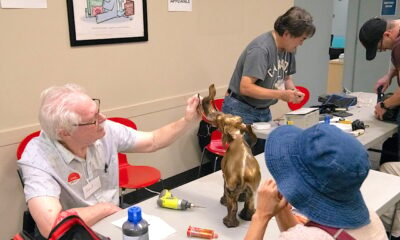Business
German Firm Voltfang Innovates with Used EV Batteries for Energy Storage

A German company is revolutionizing energy storage by repurposing used electric vehicle (EV) batteries. Voltfang, which translates to “catching volts,” has launched its first industrial site in Aachen, located near the borders of Belgium and the Netherlands. The facility, which boasts around 100 employees, is now the largest of its kind in Europe dedicated to the refurbishment of lithium-ion batteries.
David Oudsandji, the CEO of Voltfang, expressed optimism that this initiative will aid Germany in reducing its reliance on fossil fuels while enhancing its use of renewable energy sources. “We want to ensure European sovereignty in energy supply by enabling renewable energy production through storage,” Oudsandji stated. He emphasized that Germany can generate significant electricity from solar and wind but must improve its battery storage capabilities to maximize this potential.
At the new facility, technicians evaluate used EV batteries to assess their remaining lifespan. Batteries deemed suitable for further use are reconditioned and fitted into cabinets roughly the size of large refrigerators, effectively transforming them into substantial power banks. Among the company’s first clients is the discount supermarket chain Aldi Nord, which aims to utilize the stored power from its rooftop solar panels.
Renewable Energy Goals and Challenges
Founded in 2020 by three university engineering students, Voltfang aims to manufacture enough systems by 2030 to achieve a storage capacity of one gigawatt-hour (GWh) of electricity annually, sufficient to power approximately 300 homes. This effort aligns with Germany’s ongoing “Energiewende,” or energy transition. Last year, renewable sources accounted for nearly 60 percent of the country’s electricity production, with a goal of reaching 80 percent by 2030.
Despite the progress, challenges remain, particularly during periods when solar energy is not available and wind generation is low. These “dark lulls,” which typically occur in winter, have led Germany to temporarily rely on electricity imports from French nuclear reactors and Polish coal plants. In response, the government, led by Chancellor Friedrich Merz, plans to construct approximately 20 new gas-fired power plants by 2030. This decision has raised concerns among environmentalists and political factions, who argue it undermines Germany’s climate goals, including achieving carbon neutrality by 2045.
Growth of the Battery Sector
The European battery sector is still in its early stages but is poised for rapid expansion. According to Marc Sauthoff from the business consultancy Roland Berger, small-scale distributed energy assets such as battery storage will play a crucial role in developing efficient energy systems. The stationary storage market in Germany has seen remarkable growth, with around 6 GWh of capacity installed by the end of 2024, a significant increase from 2.5 GWh in 2022.
Voltfang anticipates reaching profitability by next year, though Oudsandji acknowledged that challenges persist. The supply of used EV batteries is limited, as many vehicles are relatively new and still on the road. Competing against new batteries, primarily produced in China, which are becoming increasingly efficient and affordable, poses another hurdle.
Oudsandji highlighted that the process of testing and refurbishing old batteries is more intricate than simply acquiring new ones. “But the big advantage is that it is more sustainable,” he explained. “It is cheaper and allows us to create a circular economy, thus ensuring Europe’s independence in resource supply.”
As Voltfang continues to innovate in the energy storage sector, its efforts contribute to a broader movement towards sustainable energy solutions in Germany and beyond.
-

 World3 months ago
World3 months agoScientists Unearth Ancient Antarctic Ice to Unlock Climate Secrets
-

 Entertainment3 months ago
Entertainment3 months agoTrump and McCormick to Announce $70 Billion Energy Investments
-

 Science3 months ago
Science3 months agoFour Astronauts Return to Earth After International Space Station Mission
-

 Lifestyle3 months ago
Lifestyle3 months agoTransLink Launches Food Truck Program to Boost Revenue in Vancouver
-

 Technology2 months ago
Technology2 months agoApple Notes Enhances Functionality with Markdown Support in macOS 26
-

 Top Stories7 days ago
Top Stories7 days agoUrgent Update: Fatal Crash on Highway 99 Claims Life of Pitt Meadows Man
-

 Sports3 months ago
Sports3 months agoSearch Underway for Missing Hunter Amid Hokkaido Bear Emergency
-

 Politics2 months ago
Politics2 months agoUkrainian Tennis Star Elina Svitolina Faces Death Threats Online
-

 Technology3 months ago
Technology3 months agoFrosthaven Launches Early Access on July 31, 2025
-

 Politics3 months ago
Politics3 months agoCarney Engages First Nations Leaders at Development Law Summit
-

 Entertainment3 months ago
Entertainment3 months agoCalgary Theatre Troupe Revives Magic at Winnipeg Fringe Festival
-

 Politics1 week ago
Politics1 week agoShutdown Reflects Democratic Struggles Amid Economic Concerns





















